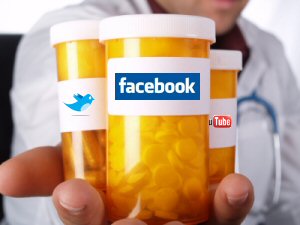Drug Companies Wait for FDA Guidelines on Social Media Marketing

–Guest post by American University graduate student Natalie Shuster.
Since 2009, the Food and Drug Administration (FDA) has engaged in active conversation with national pharmaceutical and biotechnology companies regarding the need to utilize rapidly expanding online social media and digital media platforms. With the FDA’s 2010 “Public Hearing on Promotion of FDA-Regulated Medical Products Using the Internet and Social Media Tools,” the Industry helped develop white papers and responded to ‘calls for comments.’ Three years later, industry leaders around the world still anxiously await the forthcoming FDA guidance and the further implications that such regulation will have on pharmaceutical engagement in social media.
Health information remains a hot topic on the internet. A June 2009 study by the Pew Internet & American Life Project found that 61 percent of American adults search online for health information and that 41 percent of these online patients have read someone else’s comments on an experience or medical issue through an online newsgroup, website or blog. Consumers of online health information use the internet to research, share and evaluate specific ailments and treatment methodologies. Without proper input from drug makers and Industry professionals, the likelihood of the dissemination of incorrect information is heightened.
While numerous corporations and industries have been able to embrace the networking and social capabilities of the internet and platforms such as Facebook and Twitter, the pharmaceutical industry has faced vast challenges with tackling the rapidly changing digital arena. According to AstraZeneca, “despite the lack of guidance and clarity, most major pharmaceutical manufacturers engage in social media for product promotion, disease/health awareness and corporate affairs purposes to varying extents.” However, there is still a strong demand for formalized FDA regulation.
To date, there are two main problems with the lack of formal regulation, according to input from social media monitoring companies and white papers submitted by AstraZeneca. First, the application of existing rules is inconsistently enforced when translated to the online environment. Thus, many pharmaceutical manufacturers are hesitant to fully engage in the digital space. Second, presently existing FDA regulations fail to adequately address the reality of online social media platforms. With these rapidly evolving communications environments, pharmaceutical companies face a whole new set of opportunities and risks.
It is also important to note the differences between the utilization and communication factors within each online platform. The FDA needs to develop a series of strategic regulations that apply to company-controlled online communications, company-controlled and hosted online communications, as well as real-time, social media communications. It is within the final area, of real-time communications that regulation faces the largest potential risks with chat areas and the spread of information virally.
Social media is undoubtably a fundamental part of advancing public health—part of the FDA’s core mission. While social media does not always lend itself to black and white decision making, the FDA should recognize that not everything in social media is easily categorized and create legislation that bends accordingly.
This past June, Facebook took industry social media policy into its own hands, no longer allowing drug makers to disable ‘comments’ on their social media pages. The two-way nature of communications permitted in social media, is one of the most difficult barriers for industry to maintain compliance with regulations. By no longer allowing for comments to be monitored, drug makers faced potential legal issues with the reporting of adverse events, negative information and libelous information. While Facebook’s action was consistent with their overall stance on open communication, industry was left with the tough question of whether or not to abandon the idea of online social media, entirely.
Today, drug companies are increasing staffing and funding in the area of digital media strategy. According to a study conducted on “Pharmaceutical Digital Marketing and Social Media: Managing Growth, Mitigating Risk and Mastering Strategy,” drug companies allocated an average of $750,000 for their digital marketing budgets this year, with digital marketing budgets currently ranging from $150,000 to several million dollars.
As the number of years the industry awaits FDA regulation tick-by, one must question at what point pharmaceutical and biotechnology companies will choose to dive into the new medium sans-regulation or abandon the idea entirely. At this rate, once regulation is finalized a new social media platform will already be developed—creating a need for updated regulation once again.
–Guest post by Natalie Shuster, an MA student in Public Communication at American University in Washington, D.C. Shuster is a full time graduate student and is employed as Community Affairs Associate at MedImmune, a local biotechnology company.
Read other posts from her project team examining social media influence and regulation in the pharmaceutical industry as well posts from other project teams in her course.





